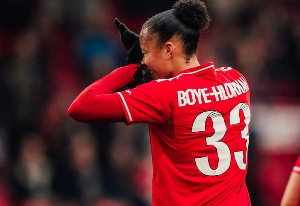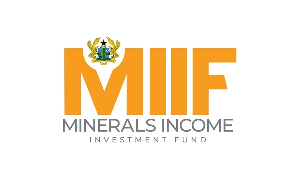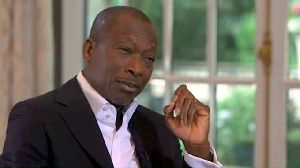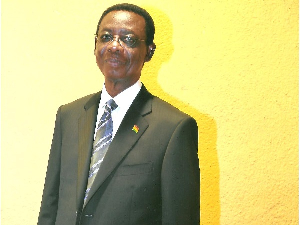General News of Thursday, 21 May 2020
Source: www.classfmonline.com
Coronavirus: Gov’t hasn’t said schools are reopening – Oppong Nkrumah
Information Minister Kojo Oppong Nkrumah has said the government has never said anywhere that it intends reopening schools.
"Government is not saying that schools are to re-open soon, what we are saying is that consultations on what it takes to re-open schools is what we are currently engaged in", Mr Oppong Nkrumah clarified at a press briefing on Thursday, 21 May 2020.
The Ghana Education Service (GES) recently came under criticism from some teacher unions over a letter it sent requesting proposals for reopening of schools in the country amid the coronavirus pandemic.
Four teacher Unions – GNAT, NAGRAT, TEWU and CCT – said at a joint press conference that the GES letter, which suggests that the body has launched a stakeholder consultation to provide President Akufo-Addo with measures to be taken ahead of a possible reopening of all basic and senior high schools, is uncalled for.
Schools have been on break since March this year after the President’s first address to the nation on the COVID-19 pandemic.
The President, in his recent address, extended the ban on all public gatherings which include school activities, to the end of May, indicating that there will be a review.
In view of this, the GES, in a letter dated 13 May 2020, signed by Director-General, Kwasi Opoku-Amankwa, urged all stakeholders, including the leadership of the teacher bodies, to contribute their ideas on how the schools can ensure safety and maximum security if pupils are allowed to resume lessons.
But the teacher unions think this is misplaced.
Speaking at a press conference in Accra, Mr Thomas Musah, the General Secretary of GNAT, said: "This particular letter, which has come out, is creating fear and panic among the rank and file of our members. Currently, the [COVID-19] figures we have is 5,735 with 29 deaths and when people are looking at these particular figures, certainly, it will create fear and panic among them.
"We're talking about a situation where when a teacher is going to school, the teacher will board trotro and you have certain children in a particular class coming from all walks of life. The question is, do we know the status of all the teachers who will be going to the schools? Have they been tested? The children, have they been tested? These are fundamental issues we should all establish. If we don't do that and we start talking of reopening at this particular moment, the question is why won't we wait for the President to come and speak and we take it up from there. Schools or educational facilities are not the only places closed down..."
Also, the Council for the National Council of Parent-Teacher Associations (NCPTAs) has indicated that it will be “premature to reopen schools”.
However, some private schools think schools can reopen under strict observance of safety protocols.
In a proposal to the Ghana Education Service, the Ghana National Association of Private Schools (GNAPS) and the Conference of Heads of Private Secondary Schools (CHOPSS) are jointly of the view that safety mechanisms ought to be rolled out rapidly to pave the way for, at least, final-year students in all senior high schools to resume school.
In an interview with Class 91.3FM’s Blessed Sogah, the public relations officer of (CHOPSS), Naphtali Kyei-Baffour, mused: “Why not we start for the final year students?”, explaining: “What we mean simply is that, at least, it’s a defined number, they are not many. … So, we can control, we can simply manage the situation”.
He said: “If possible, even before the reopening … let us test all these final-year students including teachers”.
CHOPSS further explained that it gave a timeline of mid-June to the government to consider.
In addition, the General Secretary of the Ghana National Association of Private Schools (GNAPS), Justice King Essiel, said: “If there is something we must do, let us do it right now. …So, let us take steps and begin to see how we can begin to allow schools to resume and let’s give priority to our education”.
A former Vice-Chancellor of the University of Ghana, Prof Ivan Addae Mensah, however, has urged caution in reopening schools, saying rushing into doing that amid the coronavirus pandemic could be “chaotic”.
In his view, the government must listen to the teachers and headteachers and do extensive consultations with the necessary stakeholders before reopening schools.
“It’s a very complex issue, especially with regard to the rural areas”, Prof Addae Mensah told Benjamin Akakpo on Class91.3FM’s Executive Breakfast Show on Thursday, 21 May 2020, explaining: “If you take the rural areas, they have no other alternative to school for learning anything. The poorer people, apart from what they learn in school – if you talk about learning from computer, from this, from that – they just don’t have access to it”.
“On the other hand, they are the most crowded group of schoolchildren. You go to some rural areas, one class can have as many as 80 people in a class, so, you go and pack these people in; even if you divide them into three groups, that is going to be about 25 to 30 in a class, that’s a handful.
“So, it’s a very very complex issued and I would want to advise that if the government has any intention, the discussion should not be unilateral, it should be between the stakeholders, especially the teachers and headteachers and the educational authorities so that the correct solution is found that would be suitable for every child in this country, not just the children in Accra or the children of the elite because, usually, what I’ve found in this country is that, usually, when we go in for policies, we seem to do things as if Accra is Ghana and we forget that this country is very diverse, and more often than not it is the majority of children who suffer”.
“So, we shouldn’t be in any rush – that’s my opinion – we shouldn’t be in any rush, especially when the teachers are advising and the parents themselves are anxious. We shouldn’t be in any rush to send the children to school, especially when we don’t even know the situation in the rural areas”.
In Prof Addae Mensah’s view, “The private schools, you know they are looking at this purely from their own employment point of view”, observing: “A lot of them, the teachers are complaining that because the schools are not opening, the parents are not paying fees and, therefore, the teachers are not being paid, etc., it’s purely from an economic point of view but have they looked at it from the point of view of the children who are targets of whatever action they take? That’s why I think that the discussion should be universal, it should be as comprehensive as possible with all the possible implications clearly laid out before we take any decision”.
He, however, warned: “It shouldn’t be rushed”, noting: “We shouldn’t go tomorrow or next week and say: ‘Oh, schools, go and make your own arrangements of social-distancing and all that’. It will be just chaos”.
“So, they should listen to the teachers, they should listen to the headteachers. I know there are some private schools in less endowed areas but most of the private schools are quite well-endowed, of course, if they don’t pay fees, they can’t function. I know some private schools where arrangements have been made for the children to receive even one-on-one teaching; you can look at that, provided the person’s parents are prepared to pay”, Prof Addae Mensah said.
Entertainment











